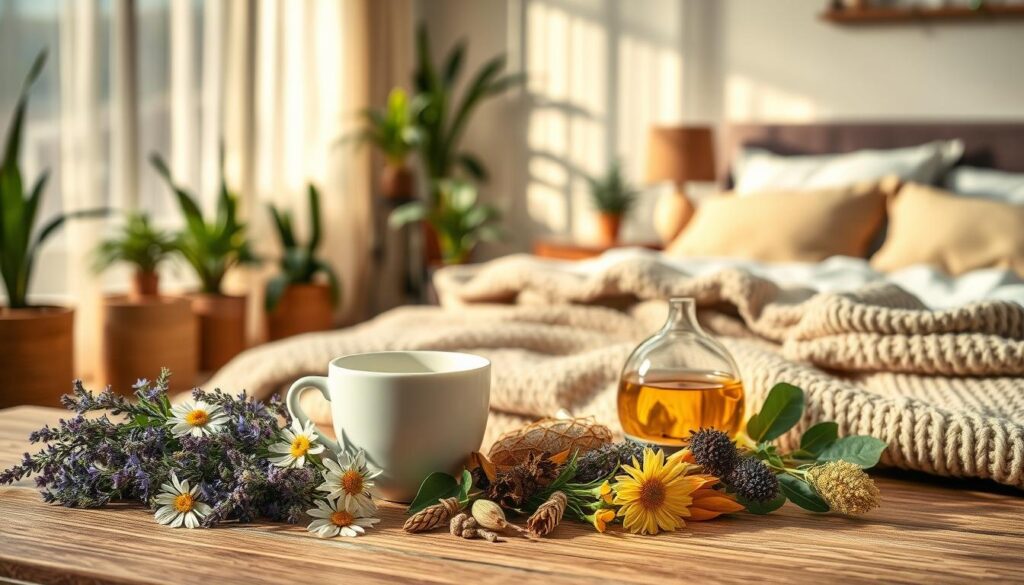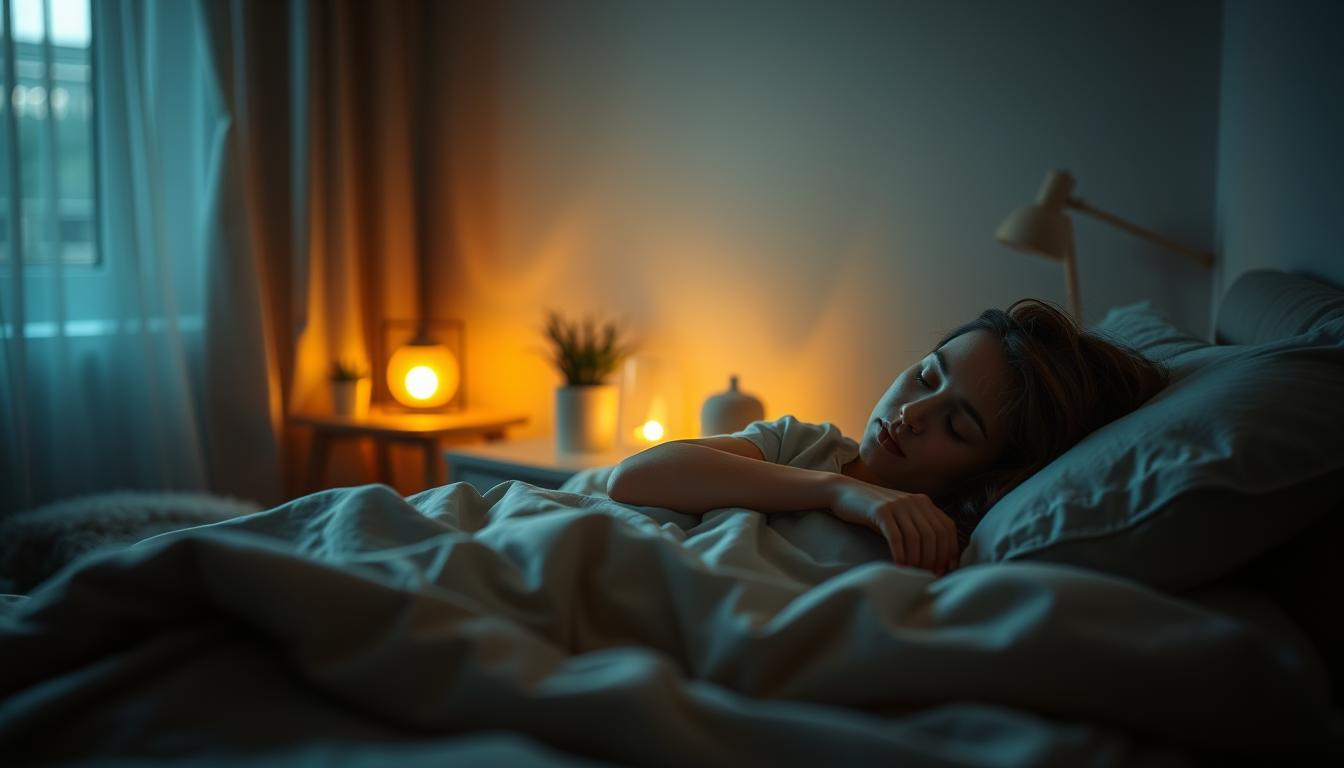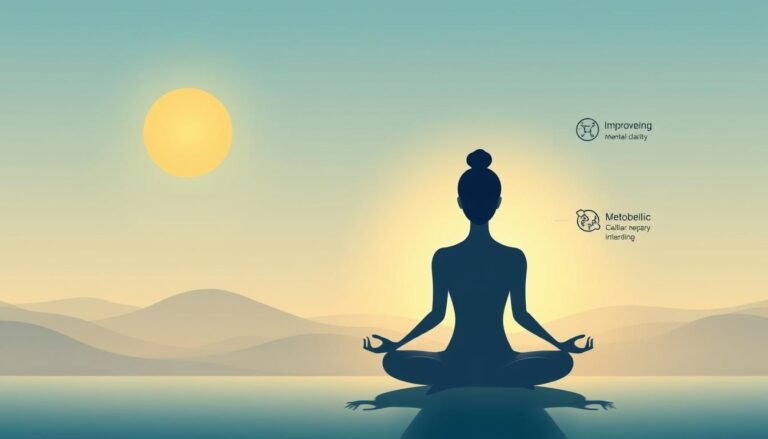Did you know that about 70 million Americans have trouble sleeping? You don’t have to struggle with sleep anymore. This guide will show you 7 natural ways to sleep better, making your nights restful and refreshing.
Quality sleep is more than just lying down. It’s about setting up the right space, knowing your body’s needs, and using techniques that tell your brain it’s time to sleep. Whether you face occasional insomnia or want better sleep, these tips will change your sleep routine.
Sleep is essential for your health and happiness. By using these sleep tips, you’ll not only sleep better but also feel better during the day. Your mood and physical health will improve too.
Key Takeaways
- Understand the critical importance of quality sleep
- Learn natural techniques to improve sleep patterns
- Discover how environment impacts sleep quality
- Recognize the connection between lifestyle and rest
- Implement practical strategies for deeper sleep
Understanding the Importance of Quality Sleep for Overall Health
Sleep is more than just a nightly routine. It’s a critical process that dramatically impacts your physical and mental well-being. Your body undergoes essential restoration and repair during sleep, making sleep quality a fundamental aspect of maintaining optimal health.
Your sleep isn’t a uniform experience. It consists of multiple complex cycles that play crucial roles in restorative sleep and overall wellness.
The Science Behind Sleep Cycles
Sleep cycles typically include different stages that repeat throughout the night:
- Light Sleep Stage: Initial relaxation and transition
- Deep Sleep Stage: Physical recovery and cellular repair
- REM Sleep: Mental processing and emotional regulation
Health Consequences of Poor Sleep
Chronic sleep deprivation can lead to significant health risks, including:
- Weakened immune system
- Increased risk of cardiovascular diseases
- Cognitive decline and memory issues
- Mental health challenges like anxiety and depression
“Sleep is the golden chain that binds health and our bodies together.” – Thomas Dekker
Benefits of Restorative Sleep
Prioritizing sleep quality offers remarkable advantages:
| Sleep Benefit | Physiological Impact |
|---|---|
| Enhanced Cognitive Function | Improved memory and learning capabilities |
| Emotional Balance | Better stress management and mood regulation |
| Physical Recovery | Muscle repair and hormone regulation |
Understanding these sleep dynamics can transform your approach to nightly rest and overall health management.
Creating the Perfect Sleep Environment for Optimal Rest
Making your bedroom the best for sleep is key. It can greatly improve how well you rest. So, making your sleep space just right is very important.
First, think about your bed. The right mattress and pillows can change your sleep for the better. Look for ones that keep your body in the right shape and feel comfy for you.
- Choose a mattress with proper support for your body type
- Select pillows that maintain neck and spine alignment
- Consider memory foam or hybrid mattresses for personalized comfort
Temperature is also very important for good sleep. Keep your room between 60-67 degrees for the best sleep. Use light, breathable bedding and soft pajamas to stay cool.
Reducing noise and light is also key. Here’s what you can do:
- Blackout curtains to block external light
- White noise machines to mask disruptive sounds
- Earplugs for complete sound isolation
Pro tip: Create a calm, clutter-free bedroom that signals to your brain it’s time to wind down and rest.
By following these tips, you can turn your bedroom into a sleep haven. You’ll wake up feeling refreshed and ready to go every morning.
The Role of Circadian Rhythm in Sleep Quality
Your body has an internal clock called the circadian rhythm. It controls when you feel awake or tired. This is key to understanding sleep science and how to sleep better.
Knowing about your circadian rhythm can help you sleep better. Your body reacts to things like light and temperature. These things affect your internal clock.
Natural Light Exposure
Sunlight is very important for your circadian rhythm. Being in natural light during the day helps your body know when to sleep and when to be awake.
- Spend at least 30 minutes outdoors during daylight
- Open curtains in the morning to let natural light in
- Avoid bright screens before bedtime
Temperature Regulation
Your body temperature changes throughout the day. This affects how well you sleep. Keeping your sleep area cool can help you sleep better.
| Temperature Range | Sleep Impact |
|---|---|
| 60-67°F (15-19°C) | Ideal sleeping temperature |
| Above 70°F (21°C) | May disrupt sleep patterns |
| Below 60°F (15°C) | Can cause discomfort |
Timing Your Sleep Schedule
Being consistent with your sleep schedule is important. Try to go to bed and wake up at the same time every day. This helps your body stay in sync.
- Establish a consistent bedtime routine
- Create a relaxing pre-sleep environment
- Avoid heavy meals and caffeine before bed
Pro tip: Listen to your body’s natural signals and create a sleep schedule that supports your unique circadian rhythm.
Sleep Better Tonight: 7 Natural Tips for Deep & Restful Sleep
Do you find it hard to sleep well? You’re not alone. Getting good sleep is key for your health. Here are seven natural ways to sleep better tonight and feel great tomorrow.
- Establish a Consistent Sleep ScheduleYour body likes routine. Try to sleep and wake up at the same time every day. This helps your body get into a natural sleep cycle.
- Create a Relaxing Bedtime RitualMake a calming routine before bed. This could be reading, stretching, or meditation. It tells your body it’s time to relax.
- Optimize Your Sleep EnvironmentMake your bedroom a sleep haven. Keep it cool, dark, and quiet. Use soft bedding and avoid electronic devices.
- Practice Natural Sleep AidsTry herbal teas like chamomile or lavender. They can calm your mind and body for sleep.
- Limit Screen Time Before BedBlue light from screens can mess with your sleep. Try to avoid screens for at least an hour before bed.
- Exercise RegularlyExercise can make you sleep better. Aim for 30 minutes of moderate activity daily. But, avoid intense workouts before bed.
- Manage Stress and AnxietyUse relaxation techniques like deep breathing or yoga. They can help calm your mind and reduce stress that keeps you awake.
By following these natural tips, you can change your sleep for the better. Remember, it takes practice to improve your sleep quality.
Essential Sleep Hygiene Habits for Better Rest
Getting good sleep is key for feeling well. Sleep hygiene is about getting ready for a good night’s sleep. By following a bedtime routine, you can sleep better and wake up feeling great.
Evening Routine Basics
Your bedtime routine is important. It tells your body it’s time to relax. Try to have a routine that helps you slow down at night:
- Set a fixed bedtime and wake-up time
- Create a calming pre-sleep ritual
- Practice gentle stretching or light yoga
- Read a book or listen to soft music
Digital Device Management
Electronic devices can mess with your sleep. They give off blue light that can keep you awake. Here’s how to handle it:
- Stop using screens at least 1 hour before bedtime
- Use blue light filtering apps or glasses
- Keep devices out of the bedroom
- Enable night mode on smartphones and tablets
Bedroom Organization Tips
Your bedroom affects how well you sleep. Make it a calm place for rest:
- Maintain a cool room temperature (60-67°F)
- Use blackout curtains to minimize light
- Invest in a comfortable mattress and pillows
- Keep the space clean and clutter-free
Remember, being consistent is important for good sleep habits. Even small changes can make a big difference in how well you sleep.
Natural Remedies and Herbal Solutions for Insomnia

Struggling with sleepless nights? Natural sleep remedies offer a gentle way to find insomnia relief. They avoid harsh drugs. Your journey to better sleep starts with herbal sleep aids that help your body rest naturally.
“Nature provides powerful solutions for those seeking peaceful, restorative sleep.” – Sleep Research Institute
Discovering the right mix of natural supplements can change your sleep. Melatonin supplements are a top choice for fixing sleep patterns and helping your body’s clock.
- Chamomile tea: Calms nervous system and promotes relaxation
- Valerian root: Reduces anxiety and improves sleep quality
- Lavender essential oil: Creates a soothing sleep environment
- Magnesium supplements: Supports muscle relaxation
Understanding these natural remedies takes looking at your own needs. Not all supplements work the same for everyone. Always talk to a healthcare professional before starting any new sleep plan.
| Herbal Remedy | Primary Benefits | Recommended Dosage |
|---|---|---|
| Chamomile | Reduces anxiety, promotes relaxation | 1-2 cups before bedtime |
| Valerian Root | Improves sleep quality, reduces insomnia | 300-600 mg before sleep |
| Melatonin | Regulates sleep-wake cycle | 0.5-5 mg nightly |
Your journey to better sleep is simple. By trying these natural sleep remedies, you can find a natural way to fight insomnia. This supports your body’s need for restful sleep.
Stress Management Techniques for Peaceful Sleep
Struggling with sleep anxiety can mess up your sleep and health. It’s important to manage stress to have a calm bedtime routine. This helps you relax and get ready for sleep.
Learning to handle stress can change how you sleep. Stress makes it hard to fall asleep and stay asleep. This creates a cycle of anxiety that’s hard to break.
Meditation Practices for Calm
Meditation is a great way to relax and prepare for sleep. Here are some easy methods:
- Mindfulness meditation focusing on breath
- Guided visual relaxation
- Body scan meditation
- Loving-kindness meditation
Breathing Exercises to Reduce Anxiety
There are breathing techniques that can help reduce anxiety and relax you:
- 4-7-8 Breathing Method
- Diaphragmatic breathing
- Box breathing technique
Progressive Muscle Relaxation
This method helps release tension and stress. It prepares your body for sleep:
| Muscle Group | Relaxation Technique |
|---|---|
| Facial Muscles | Gentle tensing and releasing |
| Shoulder Area | Slow, deliberate stretching |
| Arm and Hand Muscles | Squeeze and release method |
Remember, consistent practice is key to mastering these stress management techniques for better sleep.
Dietary Choices That Impact Sleep Quality

Your diet is key to good sleep. Knowing how foods and drinks affect your sleep cycles helps you choose better. This leads to better rest.
Caffeine and sleep don’t mix well. A morning coffee is fine, but afternoon caffeine messes with your sleep. Try to avoid caffeine 6 hours before bed to sleep better.
- Natural sedatives that promote relaxation include:
- Chamomile tea
- Valerian root
- Passionflower
- Melatonin boosters found in food:
- Tart cherries
- Nuts like almonds
- Fatty fish
Some foods can really help your sleep. Tryptophan-rich foods like turkey, eggs, and cheese boost serotonin and melatonin. These help control your sleep cycle. Foods high in magnesium, like spinach and pumpkin seeds, relax muscles and reduce anxiety at night.
Eating your last meal 2-3 hours before bedtime allows proper digestion and prevents potential sleep disruptions.
Stay away from heavy, spicy, or fatty meals before bed. They can upset your stomach and cause acid reflux. This makes it hard to fall asleep.
Physical Activity and Its Effect on Sleep Patterns
Understanding the link between physical activity and sleep can change your nights. Exercise helps control your sleep cycles and boosts sleep quality. Regular activity builds muscle and leads to better sleep.
Exercise and sleep are closely linked. The right exercise at the right time can make you feel more awake and refreshed.
Best Exercise Times for Better Sleep
When you exercise matters a lot. Different times can affect your sleep differently:
- Morning exercises boost daytime energy and regulate circadian rhythms
- Afternoon workouts can help reduce stress and prepare your body for rest
- Evening exercises should be completed at least 2-3 hours before bedtime
Types of Activities That Promote Rest
Not all exercises are good for sleep. Here are some that can help:
| Activity Type | Sleep Benefits | Recommended Duration |
|---|---|---|
| Yoga | Reduces stress, improves relaxation | 30-45 minutes |
| Walking | Regulates sleep cycle, reduces anxiety | 30 minutes |
| Swimming | Low-impact, full-body workout | 45 minutes |
Pro tip: Listen to your body and find the exercise routine that works best for your individual sleep needs. The goal is to create a consistent pattern that supports your natural sleep rhythms.
Common Sleep Disruptors and How to Avoid Them

Sleep disorders can ruin your chance for a good night’s sleep. It’s important to know and tackle common sleep disruptors. This helps fight insomnia and ensures you sleep well every night.
Many things can mess with your sleep quality and stop you from resting well:
- Environmental noise
- Electronic device interference
- Irregular sleep schedules
- Medication side effects
- Stress and anxiety
Now, let’s look at ways to reduce these sleep problems. We’ll also talk about making your sleep space better.
Environmental Noise Management
Unexpected sounds can really mess with your sleep. Here are some tips:
- Earplugs
- White noise machines
- Soundproofing techniques
Electronic Device Interference
Blue light from screens can mess with your sleep rhythm. Set a digital curfew by avoiding screens an hour before bed.
| Sleep Disruptor | Mitigation Strategy |
|---|---|
| Noise Pollution | Use noise-canceling solutions |
| Blue Light Exposure | Enable night mode on devices |
| Irregular Schedules | Establish consistent sleep times |
By tackling these sleep disruptors, you can make your nights peaceful. This will greatly improve your health and happiness.
Mindfulness and Relaxation Practices for Deep Sleep
Getting a calm mind for sleep is simple. Sleep meditation is a great way to relax at night. It helps your brain move from stress to sleep.
Mindfulness can change how you sleep. Here are some effective ways to calm your mind:
- Body scan meditation
- Guided visualization techniques
- Breathing exercises
- Progressive muscle relaxation
Sleep meditation quiets your mind and lowers anxiety before bed. Regular practice helps your brain relax better at night.
| Technique | Duration | Key Benefit |
|---|---|---|
| Body Scan | 10-15 minutes | Releases physical tension |
| Guided Visualization | 5-10 minutes | Calms mental activity |
| Breathing Meditation | 5 minutes | Reduces stress hormones |
Begin with 5-minute sessions and grow your practice. Consistency is key in developing a calm mind for sleep. Your brain will link these practices to relaxation, making it easier to relax each night.
“Meditation is not about stopping thoughts, but recognizing that we are more than our thoughts and our feelings.” – Arianna Huffington
Creating a peaceful sleep area helps too. Dim lights, a comfy temperature, and few distractions improve your meditation.
Conclusion
Getting a good night’s sleep is a journey. It involves understanding and using wellness practices. You’ve learned many ways to improve your sleep, from making your sleep space perfect to managing stress.
Try the holistic techniques we’ve talked about to sleep better tonight. Focus on sleep hygiene, what you eat, and relaxation. Finding the right mix might take time and patience.
Your health and energy depend on good sleep. Start making small changes and see what works for you. These changes can greatly improve your sleep, mind, and body.
Rest is essential for your health. By focusing on sleep, you’re taking care of your most important asset: yourself. Start your journey to better sleep today, with understanding and kindness towards yourself.
FAQ
How long does it take to improve sleep quality using natural methods?
Improving sleep quality takes time. Most people see better sleep in 2-4 weeks with healthy habits. Everyone’s body is different, so be patient. Stick to the techniques and be consistent.
Can diet really impact my sleep quality?
Yes, it does! What you eat and drink affects your sleep. Avoid caffeine, alcohol, and heavy meals before bed. Foods like cherries, almonds, turkey, and warm milk can help.
Are natural sleep remedies as effective as prescription sleep medications?
Natural remedies work well for many, with fewer side effects. Herbal supplements like valerian root, chamomile, and lavender can relax you. But, if you have ongoing sleep issues, talk to a doctor.
How important is my sleep environment in getting a good night’s rest?
Your sleep environment is key. Keep your room cool, quiet, and dark. Use comfy bedding and create a calm space. A good sleep environment helps you sleep better.
Can exercise really help me sleep better?
Yes, exercise improves sleep. But, exercise at the right time. Do moderate exercise in the day or early evening. Avoid intense workouts before bed.
What are the best stress management techniques for better sleep?
Techniques like meditation, deep breathing, and progressive muscle relaxation help. They calm your mind and body. Spend 10-15 minutes on these before bed for better sleep.
How does screen time affect my sleep?
Screen time hurts sleep due to blue light. Avoid screens for at least 1 hour before bed. Use blue light filtering apps or glasses if you must use devices.





